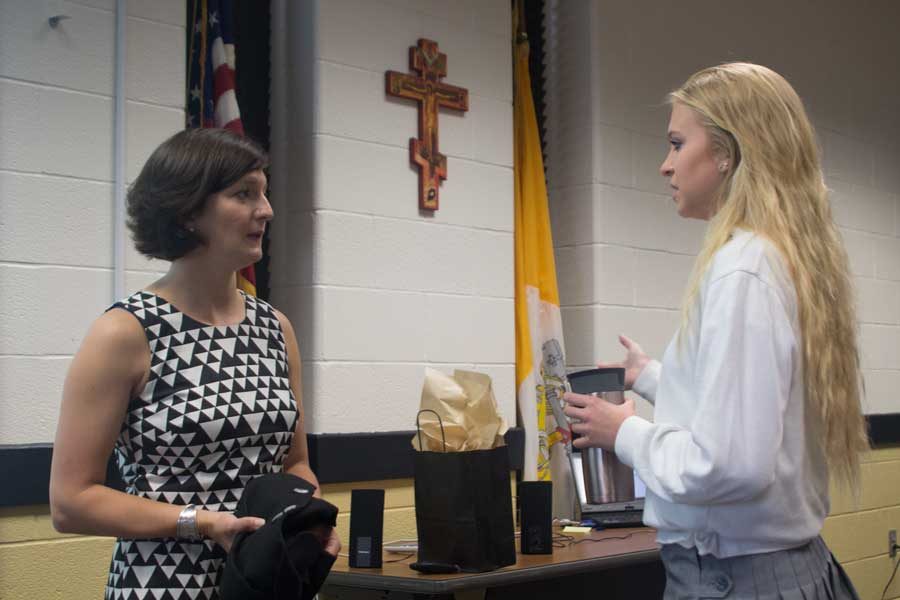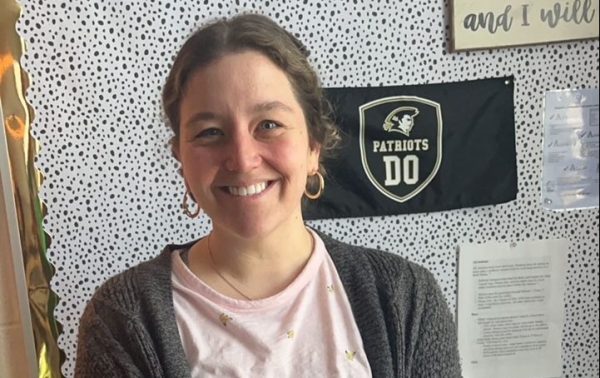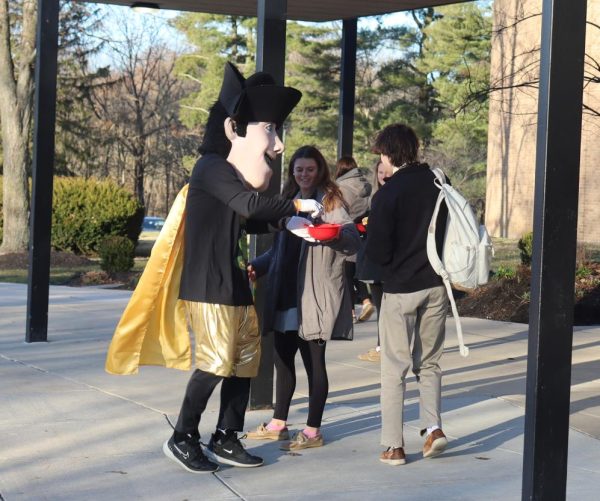Alumni returns to enlighten students on her business experience
Senior Beth Sapitowicz talks to Chantal Buscher Kelley, class of ’01, after Buscher spoke to the Entrepreneurial Studies classes about how JC prepared her for her future job. Buscher currently works at the International Olympic Committee and helps Olympic athletes find jobs once the Olympics are over.
Standing at the front of a room packed with seniors, Chantal Buchser Kelley, class of ‘01, presents a video about a company that helps athletes fulfill their dreams of becoming some of the best athletes in the world. The video was about the company Kelley works for – The International Olympic Committee.
In 2011, Kelley applied for a job at the IOC and after interviewing with them, she became a member of the Olympic Committee staff. She moved to Switzerland after her job acceptance, and has been working at the IOC ever since. “It’s tough being away from home, but it’s incredible to be right in the middle of it, working with the athletes, traveling around the world. So for right now, life is very good,” Kelley said.
Kelley’s official job at the IOC is to help athletes find jobs after they finish their Olympic career. She manages the IOC Athlete Career Program, which helps athletes achieve success in everything in their lives outside of the sports field. “All of the U.S. athletes that competed in Rio will be invited to the White House to meet the President, and then the U.S. Olympic Committee has a conference to help the athletes figure out what they want to do next,” Kelley said.
Athletes that come out of the Olympics often find it hard to find jobs because they’ve been training for their sport instead of joining the workplace. “If you compare a regular 26-year-old with an Olympian at 26, the regular person probably went to college, did an internship, had a few jobs, whereas an athlete may or may not have been to college and had any real work experience,” Kelley said.
It’s up to Kelley to make sure that the athletes are happy with the path they choose to go down after the Olympics, whether that be to start their own company or to work for someone else.
Kelley graduated from JC as an athlete who participated in swimming, track and field, tennis, and soccer. She went on to major in political science, with a minor in French and African studies at St. Mary’s College of Maryland. “I didn’t really know what I wanted to do with that [major] because I didn’t really want to go into politics,” Kelley said.
While at St. Mary’s, Kelley had the opportunity to study abroad in West Africa, and she traveled and stayed in Africa for eight months. “That really opened my eyes to a different culture and a different part of the world. I saw firsthand how sports could be a tool to communicate with people…I would go to a family’s house where I couldn’t communicate with the kids but we would play soccer and have a laugh. That was definitely a game-changer for me,” Kelley said.
After she graduated from St. Mary’s, Kelley worked at Population Services International in Washington D.C., a non-profit organization that helps people to live healthier lives. “I didn’t really love that either, so then I got a job at a small non-profit company in D.C., which promoted bicycling for transportation and health benefits,” Kelley said. During her time working with bikes, she realized that she wanted to work a full-time job in the sports field.
“When I realized that [a profession in sports] is what I wanted to do, then I found a master’s degree program in Switzerland, and I decided to try that out,” Kelley said. She attended École Polytechnique Féderale de Lausanne where she got her degree in sports administration and technology. Lausanne is also where the International Olympic Committee Headquarters is located.
For people who want to go into the professional sports business, it’s important to remember to stay calm around the athletes. “It’s easy to keep athletes on a pedestal, but athletes are just people. You have to treat them like people and it helps that I’m not a super sport fan so when I meet them, I’m not a complete nervous wreck because I’m talking to Michael Phelps,” Kelley said.
Even though she spends her days talking to athletes and travelling around the world, Kelley thinks it’s still important to remain true to yourself and just be open. “Be yourself, and that’s just not for sports, but don’t be who you think people want you to be. Keep your mind open and take the opportunities.”
Azanae Barrow is an Entertainment Editor for The Patriot and jcpatriot.com.






